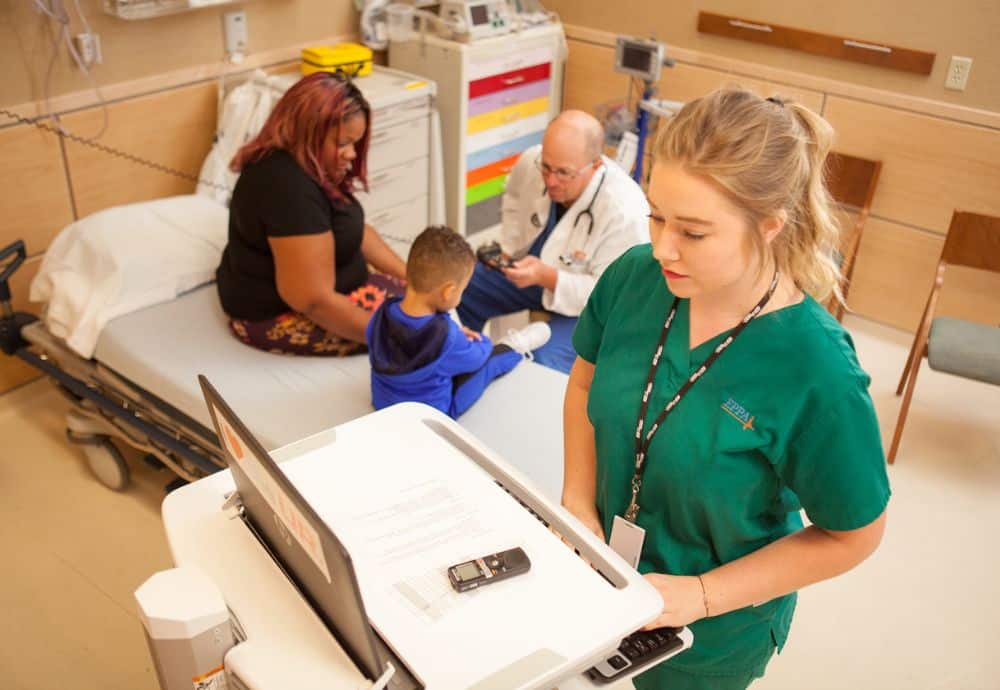4 In-Demand Healthcare Jobs That Don’t Require a Degree 2023
If you are looking for a change in your career path, it is likely that a position in the medical field can seem unobtainable if you do not have a college degree or previous medical experience or training. Here are some best healthcare jobs that don’t require a degree.
Working in healthcare jobs can be rewarding for many reasons, as it is a field that allows you to work directly to improve the lives of patients while earning higher pay than many minimum wage jobs.
While many jobs in the healthcare field require applicants to have earned a bachelor’s degree or higher, there are some jobs that require no more than a high school diploma to get started with specialized training.
Here are 4 jobs to consider if you’d like to work in the medical field without earning a bachelor’s degree.
1. Paramedic

Source: earnmydegree.com
Paramedics are responsible for responding to 911 calls and other emergencies and transporting patients to medical facilities in an ambulance.
Paramedics are usually the first to arrive at the scene of a medical emergency and must think quickly to evaluate the state of the patient’s help to determine the best option for treatment.
Paramedics are sometimes required to perform CPR, insert IVs, and utilize other techniques to ensure that a patient remains in stable condition while being transported to the hospital.
Becoming a paramedic requires an up-to-date CPR Certification Certificate and two years of emergency medical technology training, which can be completed at several institutions, including many community colleges.
When this training is completed, the completion of a specific paramedical training course will provide you with the remaining knowledge and skills required to become employed as a paramedic.
2. Medical Scribe

Source: eppahealth.com
Medical transcriptionists ensure that patient’s medical documents are accurate and up-to-date by taking detailed notes during doctors visits and other doctor-patient interactions.
They work hard to ensure that there are no errors or inconsistencies in a patient’s medical documentation, to ensure a higher quality of care.
They are also given the opportunity to work alongside physicians and to gain a better understanding of medical terminology, making this a great option for those who are considering advancing their career in medicine but would like some hands-on experience first.
To become a medical scribe, most employers require that an applicant completes a post-secondary program that will train them in the skillsets required for this position, before completing on-site training.
Companies like www.providerschoicess.com partner with physicians to provide transcription services from top medical scribes. Working for a scribe agency can be a great way to transition into a longer career in the field of healthcare.
3. Home Aid

Source: hopehealthco.org
If you would prefer to work directly with the patient(s) for whom you are providing care, another option is to become a Home Healthcare Aid.
Home aids administer care to patients who are elderly, disabled, or severely ill, and often unable to leave their homes.
Aids to a variety of tasks such as cooking for and/or feeding a patient, assisting with bathing and personal hygiene, providing transportation to doctor’s visits, and more.
To become a Home Healthcare Aid, you should have a high school diploma or GED, and anticipate completing about 100 hours of specialized training before being certified to work. Certification to be a home aid is required in some states.
4. Surgeon and Certifications
While the previous sections highlighted healthcare jobs that don’t require a degree, it’s essential to explore a surgeon’s career path, which involves extensive education and certifications. Surgeons are highly skilled medical professionals who perform surgical procedures to treat various medical conditions.
To become a surgeon, one must complete several years of rigorous education and training. Typically, it begins with obtaining an undergraduate degree, followed by attending medical school. After completing medical school, aspiring surgeons undergo residency training programs spanning several years. During this period, they gain hands-on experience and refine their surgical skills under the guidance of experienced surgeons.
One critical aspect of a surgeon’s journey is obtaining certifications relevant to their specialty. Certificates formally recognize a surgeon’s expertise and competence in a specific surgical field. The American Board of Surgery (ABS) is a recognized organization that offers certifications for surgeons in the United States. ABS QE certifications require surgeons to meet stringent requirements, including completing residency training, passing comprehensive examinations, and demonstrating ongoing professional development.
ABS certifications are available for various surgical specialties, such as general, cardiothoracic, orthopedic, and more. These certifications signify the highest competency and dedication to the surgical profession.
While becoming a surgeon requires significant dedication and commitment to education and training, it offers the opportunity to impact medicine substantially. Surgeons are vital in providing surgical interventions and improving patients’ quality of life.
news via inbox
Nulla turp dis cursus. Integer liberos euismod pretium faucibua





